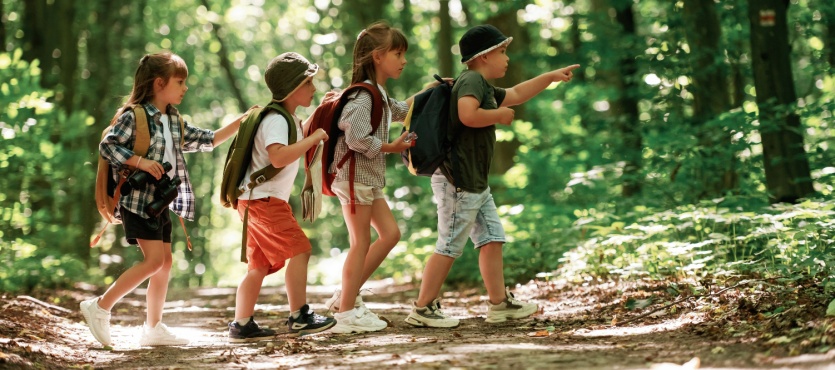Children today are growing up in a world filled with digital distractions, structured learning environments, and scheduled activities. While these elements have their benefits, they often leave little room for open-ended exploration and imaginative play. Nature-based playing offers an alternative—one that fosters creativity, enhances problem-solving skills, and encourages critical thinking.
Unlike traditional classroom settings, outdoor environments provide limitless opportunities for children to engage with their surroundings in innovative ways. Whether building forts from branches, identifying animal tracks, or experimenting with natural materials, nature-based play allows kids to develop essential cognitive skills while having fun. This unstructured exploration fuels curiosity, promotes independence, and prepares children for success in school and beyond.
Encouraging Creativity Through Open-Ended Play
One of the key benefits of nature-based play is its ability to spark creativity. Unlike manufactured toys that often come with predetermined functions, nature presents endless possibilities for imaginative play. A pile of leaves can become a hidden treasure, a fallen tree can transform into a pirate ship, and a collection of rocks can be used to create artwork.
This type of unstructured play nurtures creativity by allowing children to think outside the box. Instead of following instructions or relying on digital entertainment, they must use their imagination to create their own games, stories, and activities. Studies have shown that children who engage in outdoor play develop stronger creative problem-solving skills and a greater ability to think innovatively.
Enhancing Problem-Solving and Critical Thinking Skills
Outdoor play naturally encourages children to navigate challenges and develop problem-solving abilities. Nature doesn’t come with step-by-step instructions, so children must figure out how to adapt to their surroundings. Whether it’s building a shelter, finding the best way to cross a stream, or identifying which plants are safe to touch, kids learn to assess situations, make decisions, and adapt their approach based on trial and error.
Activities like scavenger hunts, nature-based puzzles, and team challenges provide structured opportunities for critical thinking. These experiences help children analyze situations, recognize patterns, and think strategically—important skills that transfer to academic learning and real-world problem-solving.
Developing Independence and Resilience
Nature-based play encourages children to take risks and make independent decisions in a safe environment. When exploring a forest or climbing a tree, kids learn to evaluate their capabilities, assess risks, and push themselves beyond their comfort zones.
This process builds resilience by showing children that failure is part of learning. If a structure they build collapses, they must figure out how to reinforce it. If they get lost on a trail, they must use observation skills to find their way back. These experiences foster perseverance and confidence, helping children become more adaptable and resourceful in everyday life.
Boosting Social and Communication Skills
Nature-based play isn’t just about individual exploration—it also encourages teamwork and communication. When children work together to build forts, solve outdoor challenges, or participate in group games, they learn how to collaborate, share ideas, and listen to different perspectives.
Unlike structured group activities, outdoor play allows kids to create their own rules, resolve conflicts, and develop leadership skills. These experiences teach them how to navigate social interactions in a way that builds stronger relationships and enhances their ability to work with others in the future.
Reducing Stress and Enhancing Focus
Studies have shown that spending time in nature reduces stress and improves focus in children. The natural environment provides a calming effect, allowing kids to reset and recharge. This is particularly beneficial for children who struggle with attention or sensory overload, as nature offers a less overwhelming and more engaging space for learning and play.
In fact, research has linked time in nature with improved cognitive function and increased concentration levels. Schools and camps that incorporate outdoor learning often see better academic performance, as children return to structured settings with refreshed minds and a greater ability to focus.
Encouraging a Lifelong Love for Learning
When children engage in nature-based play, they develop a natural curiosity that drives them to explore and ask questions. Why do certain plants grow in specific areas? How do animals adapt to their environments? What happens when water meets sand? These questions inspire a love for discovery and learning that extends far beyond childhood.
Encouraging children to interact with the natural world fosters an appreciation for science, environmental conservation, and hands-on exploration. Whether through guided outdoor programs or free play in nature, these experiences shape lifelong learners who are eager to question, experiment, and find creative solutions to the world around them.
Unlocking Potential Through Outdoor Exploration
Nature-based play is more than just an enjoyable pastime—it’s a powerful tool for fostering creativity, critical thinking, and resilience. By encouraging open-ended play, problem-solving, and social collaboration, outdoor experiences help children develop the skills they need to thrive in school and in life.
At Camp Live Oak, we believe in the power of nature to inspire young minds. Our outdoor programs encourage children to explore, create, and develop essential life skills in a fun and engaging environment. To learn more about how outdoor play can benefit your child, visit our contact page.

